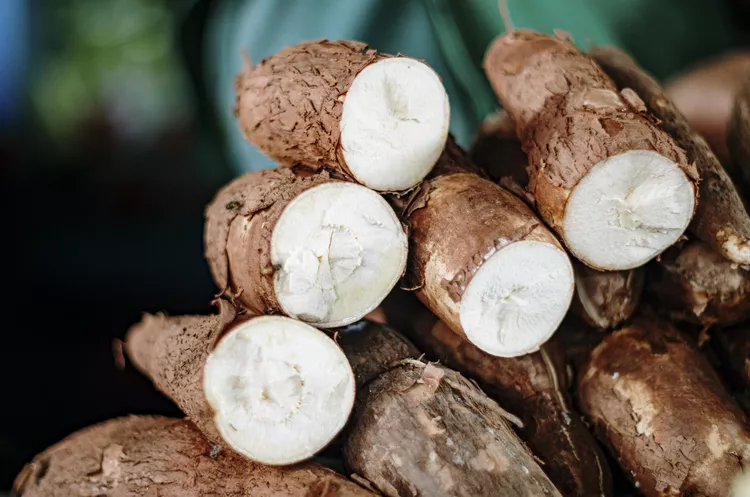
GUSTAVO RAMIREZ / GETTY IMAGES
Cassava (Manihot esculenta), commonly known as yuca, is a root vegetable that’s used as an important food source in many areas of the world, including Africa and the Caribbean. The cassava plant is resistant to drought, pests, and diseases, making it a popular carbohydrate and energy source in tropical and arid areas.1
Mohidin SRNSP, Moshawih S, Hermansyah A, Asmuni MI, Shafqat N, Ming LC. Cassava (Manihot esculenta Crantz): a systematic review for the pharmacological activities, traditional uses, nutritional values, and phytochemistry. J Evid Based Integr Med. 2023;28:2515690X231206227. doi:10.1177/2515690X231206227
Cassava is high in calories and carbohydrates and provides several essential nutrients, including vitamin C and potassium. However, it’s important to take precautions when preparing cassava as the raw root contains toxic compounds that can harm health.
Good Source of Several Essential Nutrients
Cassava is concentrated in several vitamins and minerals that tend to be low in modern-day diets.
For example, a cup of cooked cassava provides 10% of your daily needs for potassium, a mineral that’s essential for fluid balance, cellular function, and blood pressure regulation.2
Because potassium is required for blood pressure regulation, it’s critical for maintaining the health of the heart, kidneys, and more. However, research shows the average American falls short of the adequate intake (AI) for potassium, which is currently set at 3,400 milligrams (mg) per day for adult males and 2,600 mg per day for adult females.2
People who follow diets low in potassium-rich foods are more likely to develop high blood pressure, heart disease, and kidney disease, which is why choosing potassium-rich foods is important for health.34
Cassava is also high in vitamin C and folate. Vitamin C functions as a powerful antioxidant in the body, protecting cells from oxidative damage that may otherwise lead to disease.5 Because of its cellular-protective effects, consuming a vitamin C-rich diet may reduce the risk of certain health conditions, such as cancer.
For example, a review of 57 studies found that having a higher vitamin C intake was associated with a lower incidence of several cancers, including breast cancer, gastric cancer, pancreatic cancer, and prostate cancer.6
In addition to its role as an antioxidant, vitamin C is required for immune function and the production of collagen, the most abundant protein in the body.5
Cassava is also a good source of folate, a B vitamin that’s needed for red blood cell production, growth, development, and the regulation of an amino acid called homocysteine. Though homocysteine is naturally found in your body in low amounts, high levels are associated with inflammation and oxidative stress and can increase the risk of heart disease. Maintaining optimal folate levels helps keep homocysteine in check, which is why consuming folate-rich foods, like cassava, is essential for keeping your heart healthy.7
May Benefit Gut Health
Cassava contains resistant starch, which is a type of carbohydrate that resists digestion in the small intestine. Resistant starch passes into the large intestine where it’s broken down or fermented by gut bacteria. This fermentation process leads to the production of short-chain fatty acids (SCFAs) like butyrate, acetate, and propionate.8
SCFAs promote gut health in several ways. They act as a fuel source for the cells lining the large intestine, maintain the integrity of the intestinal barrier, regulate inflammation, and produce mucus. Adding sources of resistant starch into your diet can support digestive health.9
Additionally, a cup of cooked cassava provides 3.04 grams (g) of fiber, which can help support healthy bowel movements, support feelings of fullness, and promote overall intestinal health and functioning.10
U.S. Department of Agriculture FoodData Central. Cassava, cooked.
Truly appreciate your well-written posts. I have certainly picked up valuable insights from your page. Here is mine Webemail24 about Infertility Treatments. Feel free to visit soon.